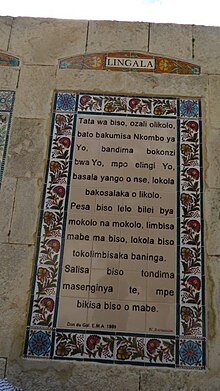Lingála
| Lingála | ||
|---|---|---|
|
Spoken in |
Democratic Republic of the Congo and Republic of the Congo , Angola | |
| speaker | 2 million native speakers and 8 million second speakers | |
| Linguistic classification |
||
| Official status | ||
| Official language in |
|
|
| Other official status in |
|
|
| Language codes | ||
| ISO 639 -1 |
ln |
|
| ISO 639 -2 |
lin |
|
| ISO 639-3 | ||
Lingála or Lingala (also Ngála or liNgála ) is an African lingua franca and trade.
It is mainly spoken in the two Congo states and Angola, where it has the status of a national language . In addition, it is slowly spreading to the south (language area of the Kikongo including northwestern Angola )
origin
Linguistically, it is one of the Bantu languages spoken in East and Central Africa as well as in southern Africa . Lingála was created along the Congo River in the Equateur province . For the time being, Lingála, originally called Lobangi, was the language of the Bangala ethnic group . At the heart of the inhabited of this region Ngala, halfway between Leopoldville (now Kinshasa ) and Stanleyville (now Kisangani ), the port was Nouvelle Anvers (New Antwerp) (since 1966 Makanza ) as one of the first trading posts of the Congo Free State established . The three named posts were among the first in the lower Congo Basin , which became Catholic mission stations from 1899 . From Lobangi, mixed with other Bantu languages, a supra-regional lingua franca and trade language emerged in the 19th century, with Égide de Bœck doing great services.
Loan words were occasionally taken from French and Kiswahili . Lingála belongs to the Lusengo languages and is linguistically closely related to Bangala and Bobangi , with about a third of the vocabulary showing lexical similarity to the latter language from which it was created.
distribution
In Congo-Kinshasa , Lingála is not the language of instruction in schools, despite its widespread use. On a private basis, however, very successful literacy courses are carried out inland by local population committees with the support of UNESCO . There are dictionaries for example into Spanish, French or English. Since 1970 the Bible has been fully translated to Lingala. There are different editions of the New Testament and the Psalms. Dr. Adolphe Dzokanga from the Institut national des langues et civilizations orientales in Paris has written several important works on Lingála.
Lingála is spoken by over ten million people in much of the Democratic Republic of the Congo and the Republic of the Congo, and to a lesser extent in the Central African Republic . It is widely used in the media, the army, the police, official speeches and music, which has also contributed to its widespread use since decolonization . In the north of Angola , too , especially in the province of Uíge, many people now master Lingála in addition to the Kikongo , which was originally spoken in northern Angola . This is especially true for Kikongo speakers who have frequent contacts across the border into the Congo. It is also spoken in parts of Gabon and Uganda . In the DR Congo, it has the status of a national language after the official language French and next to Kikongo, Kiswahili and Tshiluba . In the capital Kinshasa, it has long since overtaken the common regional language Kikongo in terms of the number of speakers.
| country | First language | alphabetized | second language | alphabetized | source |
| Republic of the Congo | 300,000 | 10% to 30% | 25% to 75% | SIL, 1993 | |
| DR Congo | 309.100 | 8,400,000 | WA, 1999 | ||
| Central Africa. Rep. |
In total, there are more than 10,000,000 speakers, and the number of speakers is increasing rapidly for demographic reasons.
classification
Niger-Congo , Atlantic-Congo , Volta-Congo , Benué-Congo , Bantoid , Southern Bantu languages , Narrow Bantu, Northwest, C, Bangi-Ntomba (C 40), Lusengo . Lingála, language code LIN, is one of the eight Lusengo languages.
literature
Textbooks
- Rogerio Goma Mpasi: Lingala for Congo and Republic of the Congo word for word. Reise Know-How Verlag, Bielefeld 1992.
- Rogerio Goma Mpasi: Lingala pronunciation trainer for Congo travelers and Zaire travelers. 1 audio CD. Reise Know-How Verlag Rump, Bielefeld 2005.
- Edouard Etsio: Parlons lingala Toloba lingala - Edition bilingue. Méthode de langue. L'Harmattan, Paris.
Dictionaries
- Malcolm Guthrie: Lingala Grammar and Dictionary: English-Lingala, Lingala-English. Baptist Missionary Society 1988.
- Budibunene Ngandu: Glossary Of Business Terms: English-lingala, Lingala-english. Aglob Pub 2004, ISBN 1-59427-034-1 .
- Ashem Tem Kawata: Dictionnaire Français-Lingala et Lingala-Français. Dictionnaire et encyclopédie. Karthala.
- Adolphe Dzokanga: Dictionnaire semantique illustré français-lingala. Dictionnaire et encyclopédie. 2 vol. Bisomoko.
- René Van Everbroeck: Maloba Ma Lokota, Lingala-français / français-lingala. Éditions L'Epiphanie, Limete (Kinshasa) 1985.
See also
Web links
- Lingála in the Ethnologue (English) https://www.ethnologue.com/language/lin
- Bibliography lingala
swell
- ↑ Angolan Bakongo had fled by the hundreds of thousands to the Democratic Republic of the Congo in 1961/63 , where they learned Lingala; when they and / or their descendants mostly returned to Angola in the 1970s, they brought this language with them, which can be heard today even in the Angolan capital Luanda .
- ^ Rogério Goma Mpasi: Lingala for Congo and Zaire. Bielefeld: Rump, 1992.
- ↑ Edouard Etsio: Parlons Lingala: Toloba Lingala . Editions L'Harmattan, 2003, ISBN 978-2-7475-3931-9 ( amazon.fr [accessed May 1, 2017]).

